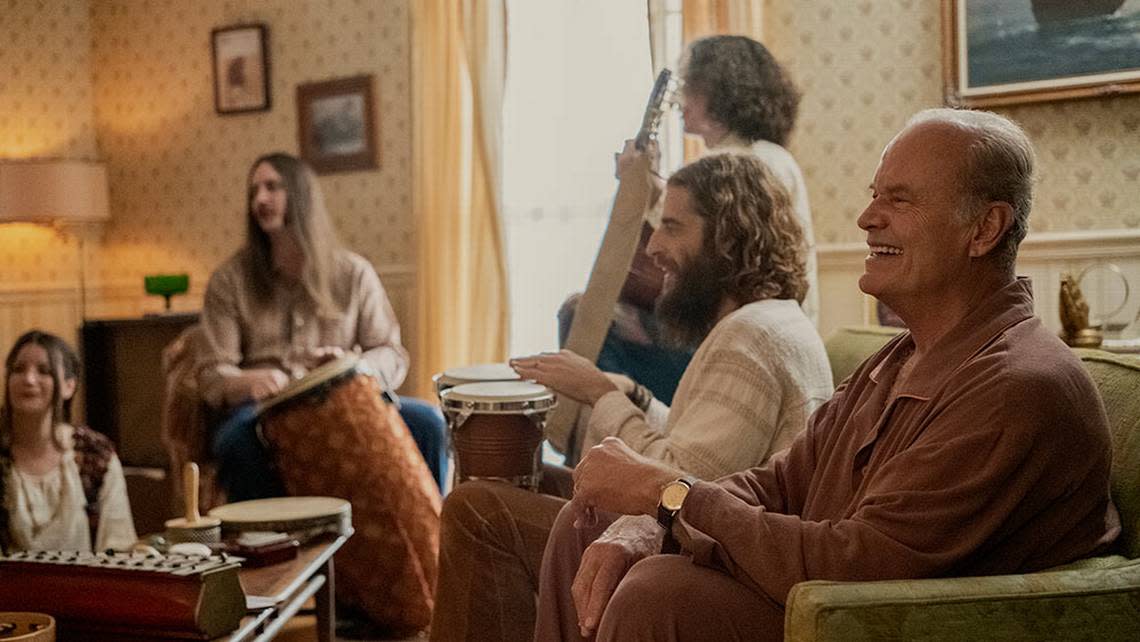‘Jesus Revolution’ and a related documentary show faith’s complications | Opinion

- Oops!Something went wrong.Please try again later.
- Oops!Something went wrong.Please try again later.
- Oops!Something went wrong.Please try again later.
My wife Liz and I finally got around to streaming “Jesus Revolution,” which since its February release has grossed more than $50 million at the box office, placing it among the more successful Christian films in history.
Longtime readers know I’m not a fan of “Christian” movies, which tend to wallow in hokeyness and theological pablum, not to mention poor production values.
But I kept hearing good things about “Jesus Revolution.”
So we finally watched it. It is indeed a cut above the usual religious fare. The script, acting and camera work are solid. The story itself is powerful.
How powerful? At one point I glanced over at Liz — who’s usually as jaded about such films as I am — and saw her full-on weeping.
“Jesus Revolution” recounts the true tale of the Jesus movement, as it was sometimes called, that swept Southern California’s hippie culture in the late 1960s and 1970s. This was front-page news.
Even though I was a rebellious teenager in Kentucky, I remember the movement. The stories were everywhere—Time, Life, the TV network news. You couldn’t miss this story, even if you were disaffected with religion, as I was.
As the film tells it, the hippie revival began with an LSD-dropping spiritual seeker named Lonnie Frisbee, who experienced a vision of Jesus and became a Christian. He started winning over his fellow hippies.
Frisbee crossed paths with a staid, small-time Costa Mesa pastor named Chuck Smith, who welcomed Frisbee and his so-called Jesus freaks into his house and his church. Soon, legions of hippies joined them, and a revival exploded that revolutionized modern Christianity, especially church music.
The Jesus movement birthed thousands of congregations. Smith and other ministers associated with the movement, including John Wimber, eventually a leader in the Association of Vineyard Churches, became icons in a larger Pentecostal-charismatic renewal that simultaneously swept the planet. Another famous minister who emerged from the movement, Greg Laurie, co-wrote the “Jesus Revolution” script.
But the movie suggests that the chief catalyst was Frisbee, an untutored and eccentric former art student who dressed like some Western European portrait of Jesus — long hair, beard, bare feet — and could be frustratingly flaky.
His bold, funny sermons, his unfettered willingness to do and say the unthinkable, drew the throngs. He prophesied. He projected boundless enthusiasm and faith.
Until I watched “Jesus Revolution,” I don’t remember ever hearing of him. Smith, Wimber, Laurie? Yes, yes and yes. But Frisbee? No. He must have been included in those 1970s news accounts I saw as a teenager, but I hadn’t heard of him since.
So, after watching the film, I searched the internet. That led me to a fuller—and more complex—account of his life, a 2005 documentary called, “Frisbee: The Life and Death of a Hippie Preacher.”
It suggests Frisbee was largely airbrushed out of the Jesus movement history by some of his former colleagues because his personal story was inconvenient.
The documentary consists largely of interviews with people who knew Frisbee up close: his ex-wife, Chuck Smith’s son, associated ministers, former Jesus freaks.
Two central things emerge.
First, Frisbee possessed an incredible “anointing,” to use Pentecostal-charismatic jargon. It means spectacular spiritual manifestations worked through him regularly.
The interviewees — none of whom comes across as nutty or gullible — tell of having seen Frisbee open the eyes of the blind and restore hearing to the deaf. One says being with him was like walking alongside a New Testament apostle. Miracles followed wherever he went.
Decades later, these folks remain awed by what they saw.
Second, Frisbee was gay, although he and supporters sometimes claimed he wasn’t, or said he had been gay but gave up homosexuality after his Christian conversion.
Many conservative Christians believed then (and still do) that homosexuality is a sin. Frisbee apparently believed that as well.
In any case, he kept having same-sex encounters, and frequenting gay bars, which he and his acolytes dismissed as “lapses.”
Whatever the particulars of Frisbee’s identity or behavior, his lapses remained an open secret, and eventually became an insurmountable hurdle for other leaders, including Smith and Wimber.
On separate occasions, Frisbee was fired by each man, and afterward was regarded as an outcast by the movement he’d largely started. A brokenhearted Frisbee saw Smith and Wimber as father figures who’d rejected him.
“Lonnie was not wise enough to understand that people constantly wanted to use him for his anointing and throw him away as a human being,” says Ken Fish, a friend.
Another friend, Darrell Ballman, recalls, “Lonnie in tears said, ‘Darrell, nobody wants me in their church.’ Said, ‘They like the goodies, Darrell, but they hate me.’”
Frisbee died at age 43 in 1993, probably of AIDS, although that, too, is disputed.
His ending left behind unreconciled questions for those who knew him.
“It was a hard thing for me to understand,” says Steve Toth, an early hippie Christian, “how he could party on Saturday night, and preach on Sunday morning, and the Spirit of God moved, and there was no doubt about it.”
Seemingly, few considered the obvious — that maybe the God of unfathomable grace who anointed Frisbee wasn’t as repulsed by his sexuality as they were. Or that they, being imperfect themselves, needed that grace as sorely as he did.
Paul Prather is pastor of Bethesda Church near Mount Sterling. You can email him at pratpd@yahoo.com.

